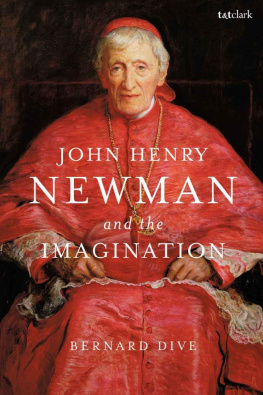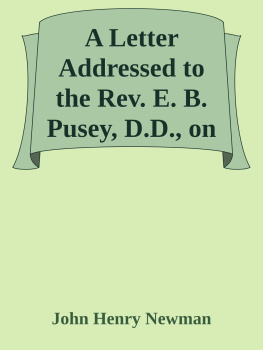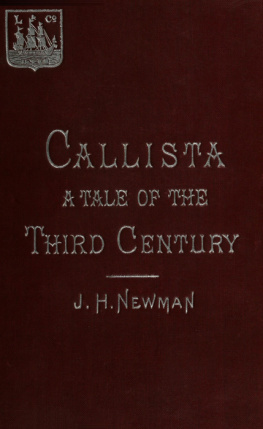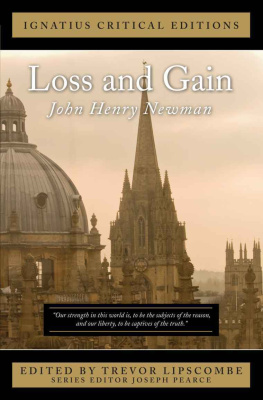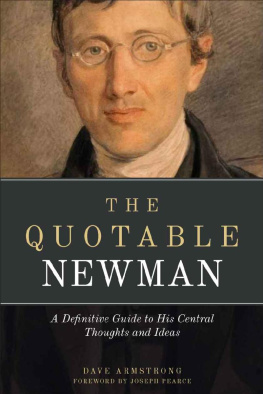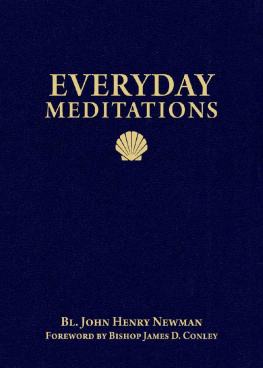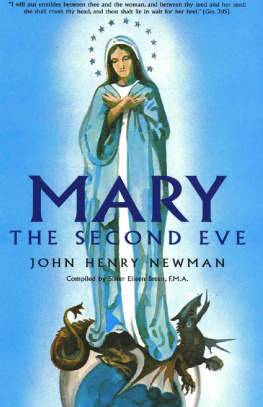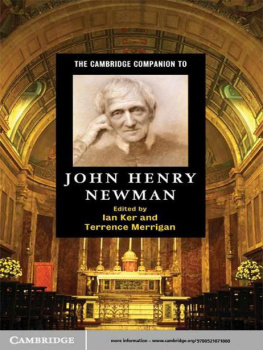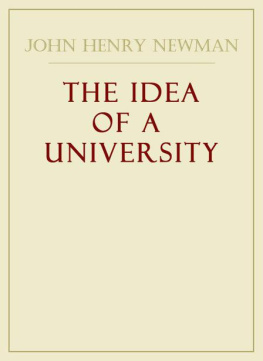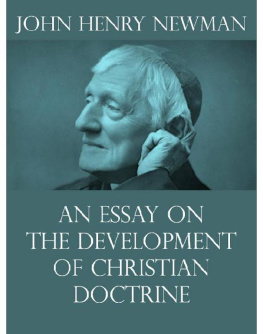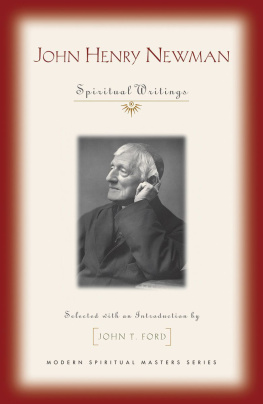Bernard Dive - John Henry Newman and the Imagination
Here you can read online Bernard Dive - John Henry Newman and the Imagination full text of the book (entire story) in english for free. Download pdf and epub, get meaning, cover and reviews about this ebook. year: 2018, publisher: Bloomsbury Publishing, genre: Religion. Description of the work, (preface) as well as reviews are available. Best literature library LitArk.com created for fans of good reading and offers a wide selection of genres:
Romance novel
Science fiction
Adventure
Detective
Science
History
Home and family
Prose
Art
Politics
Computer
Non-fiction
Religion
Business
Children
Humor
Choose a favorite category and find really read worthwhile books. Enjoy immersion in the world of imagination, feel the emotions of the characters or learn something new for yourself, make an fascinating discovery.
- Book:John Henry Newman and the Imagination
- Author:
- Publisher:Bloomsbury Publishing
- Genre:
- Year:2018
- Rating:3 / 5
- Favourites:Add to favourites
- Your mark:
- 60
- 1
- 2
- 3
- 4
- 5
John Henry Newman and the Imagination: summary, description and annotation
We offer to read an annotation, description, summary or preface (depends on what the author of the book "John Henry Newman and the Imagination" wrote himself). If you haven't found the necessary information about the book — write in the comments, we will try to find it.
John Henry Newman and the Imagination — read online for free the complete book (whole text) full work
Below is the text of the book, divided by pages. System saving the place of the last page read, allows you to conveniently read the book "John Henry Newman and the Imagination" online for free, without having to search again every time where you left off. Put a bookmark, and you can go to the page where you finished reading at any time.
Font size:
Interval:
Bookmark:
JOHN HENRY NEWMAN AND THE IMAGINATION
To Melissa, Alexander and Matthew
and
To my parents and sister
JOHN HENRY NEWMAN AND THE IMAGINATION
Bernard Dive

Contents
Anyone who studies Blessed John Henry Newman is indebted to the many excellent scholars who have written on him. For my part, I have gained greatly from the work of Ian Ker, Sheridan Gilley, James Pereiro, Eric Griffiths, Edward Short, Roderick Strange, Nicholas Lash, Frank M. Turner, Charles Stephen Dessain, Arthur Dwight Culler, David DeLaura, John Coulsdon, Stephen Prickett and Wilfrid Ward.
I owe a lot to the advice and support of friends, who have read draft chapters; I would particularly like to thank Simon Dunitz, Josh Ireland, Dr Nicholas Austin S. J. (They are not to blame for whatever is amiss with this book: they did their best with me.)
My thanks to the Birmingham Oratory, for permission to quote from the Letters and Diaries and the Oratory Papers of Newman, and to Oxford University Press, for permission to quote from the paper of S. F. Wood, on the origins and development of the Oxford Movement, first published in Ethos and the Oxford Movement , by James Pereiro.
I am very grateful indeed to Robin Baird-Smith at Bloomsbury, for being willing to commission this book, and for his encouragement, to my editors at Bloomsbury, Anna Turton and Sarah Blake, for their (much exercised) patience, and their professionalism, and to my copyeditor, Divya Darshani Bardhan, for her skilful and attentive editing.
I owe my parents thanks that cannot be measured, for a lifetime of support, kindness and wise advice. This book is dedicated to them.
My wonderful wife, Melissa, has given me unstinting and unfailingly kind support throughout the writing of this book (despite all the bother that it has involved for her). I am extremely grateful to her for that (and for a million other things). This book is dedicated to her, and to our two boys, Alexander and Matthew, for the joy they all give me every day.
For John Henry Newman, religion is real when one can believe as if one sees, and this kind of belief involves, in his view, imagination. He asks, Can I attain to any more vivid assent to the Being of a God, than that which is given merely to notions of the intellect? Can I rise to an imaginative apprehension of it? Can I believe as if I saw?understand religion, and faith, Newman reflected, again and again, in different ways, on this master vision, and its relation to the spiritual life.
Newman took it that the heart is commonly reached not through reason, but through the imagination. Religion, as engaging, and transforming, the heart, involves the imagination: man is not a reasoning animal; he is a seeing, feeling, contemplating, acting animal; so religion has ever been a message, or a history, or a vision and no legislator or priest ever dreamed of educating our moral nature by science or by argument Christianity is a history supernatural, and almost scenic: it tells us what its Author is, by telling us what He has done.
The conscience, as Newman understood it, is concerned with the concrete. Conscience is not a judgment upon any speculative truth, any abstract doctrine, but bears immediately on conduct, on something to be done or not done. Conscience, says St. Thomas, is the practical judgment or dictate of reason, by which we judge what hic et nunc is to be done as being good, or to be avoided as Something more of good and evil is presented in, or via, the perception involved in phronesis , than in such jejune generalizations as treatises can give. Newman, generally, was inclined to regard the concrete, concrete matter, as having a fullness of significance that no jejune generalizations could compass; and he considered the imagination to apprehend, to intuit, something of this fullness of significance in the concrete.
The Christian revelation, Newman maintains, presents an image of that which cannot be comprehended; to be a Christian is to live with a sense that one is in an immense unbounded system with a height above and a depth beneath and this registering of an immense unbounded system, a meaning that cannot be fully apprehended, or articulated, is an act of the imagination.reality cannot be translated into the bounded systems of the intellect. Newman would make, in this regard, a contrast between poetry and science.
Science results in system, which is complex unity; poetry delights in the indefinite and various as contrasted with unity, and in the simple as contrasted with system. The aim of science is to get a hold of things, to grasp them, to handle them, to comprehend them; that is (to use the familiar term), to master them, or to be superior to them . As to the poetical, very different is the frame of mind which is necessary for its perception. It demands, as its primary condition, that we should not put ourselves above the objects in which it resides, but at their feet; that we should feel them to be above and beyond us, that we should look up to them, and that, instead of fancying that we can comprehend them, we should take for granted that we are surrounded and comprehended by them ourselves. It implies that we understand them to be vast, immeasurable, impenetrable, inscrutable, mysterious; so that at best we are only forming conjectures about them, not conclusions, for the phenomena which they present admit of many explanations, and we cannot know the true one.
In a letter, Newman once remarked that when we ask for reasons, we rationalize When we detach and isolate things, which we should connect, we are superstitious. To have the Christian vision of faith is to have a sense of this world as presenting a veil, through which there can be glimpses of a higher reality.
A thick black veil is spread between this world and the next. We mortal men range up and down it, to and fro, and see nothing. There is no access through
The Form which we shall hereafter see face to face is seen, in the here and now, through a glass darkly: such dark apprehension is as much poetical as it is philosophical.
Newman lived a life marked by a commitment to Religious Truth above all else. He would, at the age of forty-four, abandon the Church of England the Church in which he had been brought up, in which he had become a priest, the Church which he had, in all his literary labours, sought to defend, and to strengthen and, he would, in this, abandon a form of life in which he had been settled for many years as an Oxford fellow, a clergyman, living among friends, engaged in work to which he was eminently fitted by his talents and inclinations to become a Catholic. He knew hardly any Catholics; he had little sympathy with what he had experienced of the culture of English Catholicism; in converting, he would act against almost all of his sympathies. He would do this because he had come to the view, after long deliberation, that the fullness of Religious Truth was in the Catholic Church. He would then begin life again. On converting to Catholicism, having determined that he ought to become a priest, he would undertake, in Rome, the elementary training required of all candidates for the priesthood. As he would later observe, A convert comes to learn, and not to pick and choose . He comes to Catholicism as to a living system, with a living teaching . And thus surrendering himself to the influences of his new religion, and not risking the loss of revealed truth altogether by attempting by a private rule to discriminate every moment its substance from its accidents, he is gradually so indoctrinated in Catholicism, as at length to have a right to speak as well as to hear.
Newman was brought up in the Church of England; he had, as a child, a perfect knowledge of the Catechism, and was taught to take great delight in reading the Bible, but he had he claimed in his Apologia pro Vita Sua no formed religious convictions till [he] was fifteen:principles from Keble, he took, more than that, a certain music from him or, rather, Keble made him aware of a certain music in the forms of life, and worship, of the English Church, such that he could discern in them something of the life, and worship, of the primitive Church. He would, later, regard this vision as a mere dream.
Next pageFont size:
Interval:
Bookmark:
Similar books «John Henry Newman and the Imagination»
Look at similar books to John Henry Newman and the Imagination. We have selected literature similar in name and meaning in the hope of providing readers with more options to find new, interesting, not yet read works.
Discussion, reviews of the book John Henry Newman and the Imagination and just readers' own opinions. Leave your comments, write what you think about the work, its meaning or the main characters. Specify what exactly you liked and what you didn't like, and why you think so.

